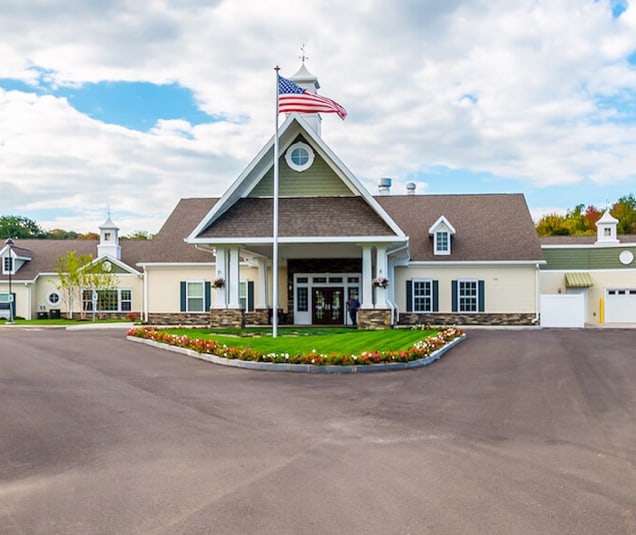Caring for a loved one can be extremely rewarding. However, that doesn’t mean it’s always the easiest task. If you’re starting to feel more tired than usual, burnt out, or even frustrated, it’s time for a change—and our community can help.
With respite care, you can take a step back and let us take care of your loved one for a change. This allows you to focus on your own needs and recharge your batteries while your loved one enjoys life in a senior living community.
What Causes Caregiver Burnout?
It takes a special kind of person to be a caregiver. Caregiving requires mental and physical energy, and it can be an extremely emotional and taxing experience. Over time, the stress adds up, and if you don’t take a break, you’re at a higher risk of developing caregiver burnout.
Caregiver burnout happens when stress and exhaustion become too much for one person to handle. This isn’t simply about feeling tired after a long day—caregiver burnout worsens over time, and it can lead to lasting health effects.
It’s easy to prioritize someone else’s needs to the detriment of your own. But the long-term consequences of burnout create risks that go far beyond feeling more tired than usual.
The Long-Term Risk of Caregiver Burnout
If you don’t find a way to rest and prioritize yourself, you’re at a higher risk of:
- Developing chronic stress or anxiety
- Experiencing depression
- Suffering from physical health issues
- Struggling with feelings of resentment or guilt
This doesn’t just affect you, either. Burnout can compromise the quality of care you provide to your loved one. This creates a cycle that becomes difficult to break—which is why it’s so important to learn to identify the earliest signs.
How to Recognize Burnout
The early signs of caregiver burnout can be subtle. However, catching them early on makes it much easier to intervene. Here’s what to look for in yourself or anyone providing care to a loved one:
- Constant fatigue, even after rest.
- Changes in weight or appetite.
- Emotional symptoms like irritability, sadness, or hopelessness.
- Avoidance of social interactions or hobbies once enjoyed.
- Neglecting self-care or personal health needs.
- Feeling overwhelmed or unable to meet the demands of caregiving.
- Unhealthy coping mechanisms, like alcoholic tendencies or overeating.
If more than one of these signs seems familiar, it might be time for a change.
What Is Respite Care for Caregivers?
If you or a loved one are experiencing burnout, there is good news. Through respite care, you can take a step back and focus on yourself—without compromising your loved one’s care.
The idea behind respite care is simple. Your loved one temporarily moves to a senior living community, where they can enjoy all the benefits of community life. They’ll be able to enjoy access to plenty of convenient amenities, engaging events, and a team of loving caregivers.
Meanwhile, you can take the chance to breathe and worry about your own needs for a change. Whether you’re looking to take a bath, read a book, run errands, or get some much-needed sleep, you’ll have the time to prioritize yourself. This makes respite care invaluable for both you and your loved one, and a great way to focus on your own well-being.
How to Tell if It’s Time for Respite Care
You may ask yourself, “Do I really need help?” The answer is often yes. If you’re starting to notice signs of caregiver burnout, or if life simply feels too overwhelming, respite care could be the answer you’re looking for.

Watch for signs such as:
- Feeling mentally and physically exhausted.
- Becoming easily irritated or frustrated with your loved one or others.
- Neglecting your own health, such as skipping meals or missing doctor’s appointments.
- Struggling to balance caregiving with other responsibilities, like work or family.
- Feeling isolated or disconnected from friends and social activities.
If these sound familiar, it’s time to try respite care.
Signs It Might Be Time to Move to Senior Living
Sometimes, caregiving needs grow beyond what can be provided at home. Knowing when it’s time for more permanent or hands-on care can be difficult, but it’s also the key to making sure you’re ahead of your loved one’s evolving needs. Senior living communities like ours give your family valuable peace of mind knowing your loved one is in good hands.
Some common signs it’s time to move to senior living include:
- Increasing difficulty managing daily tasks, such as cooking, cleaning, or personal hygiene.
- Frequent health issues or worsening medical conditions requiring professional attention.
- Decline in mobility, leading to increased falls or injuries.
- Feelings of loneliness or depression due to isolation.
- Concerns about safety, such as leaving stoves on or wandering.
The move to senior living isn’t about giving up. It’s about empowering your loved one and preserving quality of life. These communities offer a way to help your loved one maintain their independence wherever possible, and incredible peace of mind to your family.
You Deserve Relief—And We Can Help
Caring for someone you love is an incredible act of devotion. But no one is meant to handle it all alone. Respite care offers you a chance to prioritize your needs, improve your well-being, and come back stronger for your loved one.
For caregivers supporting someone with Alzheimer’s or another form of dementia, burnout can happen more quickly and more intensely. Memory care communities like Peregrine Senior Living at Onondaga Hill are uniquely equipped to provide expert support for those with cognitive impairments—giving caregivers the relief they need and residents the compassionate care they deserve.
If you’re considering respite care or a move to senior living, contact our team at Peregrine Senior Living at Onondaga Hill. We’re here to guide you through this transition and give you the peace of mind you deserve. Schedule a visit with our team today, and come explore what sets us apart.












Today is National Compliment Day! It’s a reminder to share encouragement and appreciation freely. Remember, it costs nothing to be kind, but the impact of a thoughtful word can last a lifetime!
Tell a friend they make you smile. Thank a caregiver for their dedication. Compliment a resident on their sense of humor or style. 😁
We’ve seen how positivity strengthens bonds and brightens spirits. Let’s make today—and every day—a little kinder.
peregrineonondaga.com/ ... See MoreSee Less
0 CommentsComment on Facebook
Today, we honor the life and legacy of Dr. Martin Luther King Jr.—a leader whose message of equality, compassion, and courage continues to inspire us all.
His dream reminds us that even small acts of kindness can ripple outward and create lasting change.
May we carry his vision forward by leading with empathy, listening with understanding, and building communities grounded in love and unity.
peregrineonondaga.com/ ... See MoreSee Less
0 CommentsComment on Facebook
Lots of smiles today at Onondaga Hill with making our snowmen and adding some individual art to each one. Our residents enjoyed themselves with this Creative Craft and check out all of them on display on our fireplace mantel. ... See MoreSee Less
0 CommentsComment on Facebook
Lots of smiles from our community members and their family members this afternoon as we listened to the sweet sounds of Meg Mawhinney!! We also enjoyed some delicious snacks and the warmer weather. ... See MoreSee Less
3 CommentsComment on Facebook
A new year means new beginnings, and for many, that includes finding a place that feels like home. 🏠❤️
Our community offers the perfect blend of comfort, engagement, and care. Whether you’re looking for a vibrant social lifestyle or the peace of mind that comes from knowing support is always nearby, you’ll find it here.
Schedule your tour today and see how life at Peregrine can help you or your loved one thrive in 2026 and beyond!
peregrineonondaga.com/ ... See MoreSee Less
0 CommentsComment on Facebook
As we turn the page to a new year, we take a moment to reflect on the memories we’ve made and the friendships we’ve built. Every new beginning brings fresh opportunities for connection, growth, and joy. 💫
Here’s to a year filled with purpose, peace, and the beautiful moments that remind us how wonderful life can be.
Happy New Year from all of us at Peregrine! 🎆
peregrineonondaga.com/ ... See MoreSee Less
0 CommentsComment on Facebook
Community, collaboration, and care 💫
Loved spending time at our Constant Care 24/7 monthly meeting at Park Rose with some of our favorite partners, Peregrine Senior Living at Onondaga Hill , Aging Advocates CNY , and Living With Dementia CNY 💜 ... See MoreSee Less
0 CommentsComment on Facebook